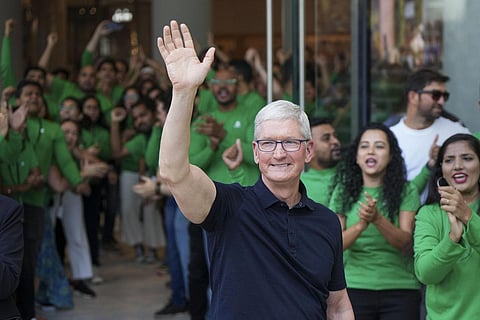

It’s been the week of The Apple. The premium iPhone manufacturer’s first direct retail entry in India in the form of two company stores opening in Mumbai’s upscale BKC commercial area and Delhi’s Saket have caught the headlines. The current flavour includes stories ranging from Apple CEO Tim Cook enjoying Mumbai’s street food vada-pav, to advertorials on the iconic timber used in the 20,000 sq ft Mumbai store.
The immediate target for Apple is to provide a feel-and-touch for consumers of its various brands. These are expensive, premium products that need direct ‘retail engagement’. In the longer term, Apple intends to slow down on China and shift as much as 25% of all iPhones assembled worldwide to India by 2025. A million jobs are what the company says will add to India’s labour market. If it can match its claim, this indeed is a welcome development.
VIEW PHOTOS | Inside Apple's first India store in Mumbai
In recent years, despite the red carpet offered to foreign investors, the story has been a mixed bag on the ground. The government conceded in Parliament that as many as 2,783 foreign companies and their subsidiaries had ceased operations between 2014 and November 2021.
Some big exits have been Cairn Energy, Holcim, Daiichi Sankyo, Carrefour, Henkel, Harley Davidson and Ford. While internal issues were responsible for the exits in some cases, many investing companies complained of hidden costs in taxation policies and, most of all, changing goalposts in the regulatory regime.
However, Apple’s entry now heralds a new opportunity. China has throttled back on its earlier liberal investment policies, and digital retailers like Jack Ma’s Alibaba and Tencent Holdings have seen a massive meltdown. So, as investors search for new hubs, the Indian government should fine-tune its offering to catch them on the rebound.
The Apple foray is significant as it affirms that India has a large and vibrant premium consumer class that has been ignored in recent years. The premium- the luxury market has its own ecosystem. Even if we take a conservative 200 million as the size of India’s middle class, it offers a huge market for retail services; and consequently for jobs and wealth generation.
Apple took 25 years to open its first stores in India as single-brand retailers were earlier banned. An easier regulatory regime will help attract higher investments and growth in this premium consumer segment.